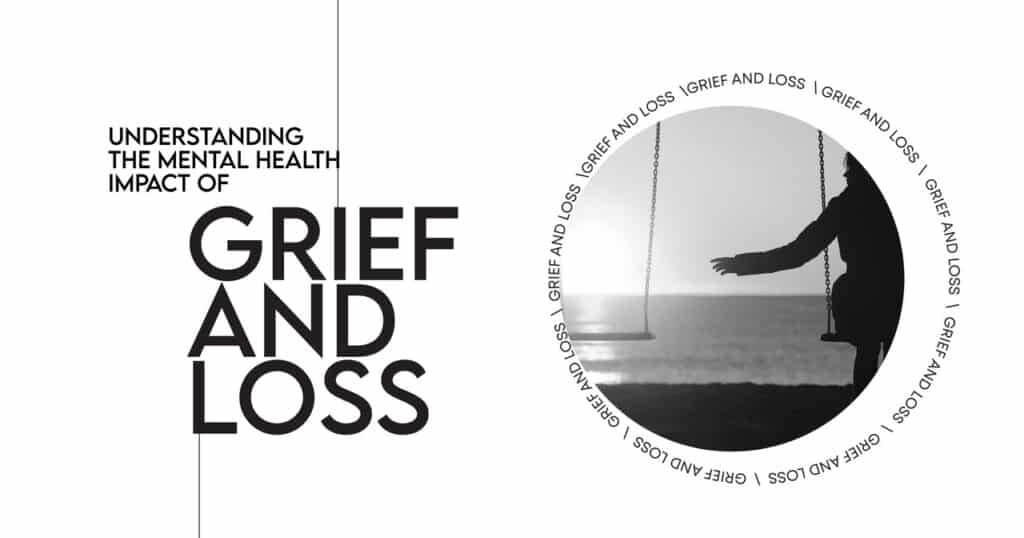Grief is a natural response to loss, encompassing a wide range of emotions such as sadness, anger, confusion, and even relief. While commonly associated with the death of a loved one, grief can also arise from various life events like the end of a relationship, loss of a job, or significant life changes. Understanding the mental health impact of grief and loss is crucial, as unprocessed grief can lead to complicated grief, depression, anxiety, and other mental health disorders. This post will explore the stages of grief, its psychological impact, and strategies for coping and healing during this difficult time.
The Stages of Grief
The most widely recognized model for understanding grief is the Five Stages of Grief proposed by Elisabeth Kübler-Ross. These stages provide a framework for the emotional experience that people may encounter, though not everyone will go through all the stages, and they may not occur in a linear order.
- Denial: This initial stage involves shock and disbelief, where individuals may find it difficult to accept the reality of the loss. It’s a normal response to the sudden death of a loved one.
- Anger: Feelings of anger and resentment may surface as individuals grapple with the unfairness of the loss. This anger can be directed toward themselves, others, or even the deceased person.
- Bargaining: In this stage, people may dwell on “what if” or “if only” statements, hoping to reverse or undo the loss.
- Depression: Profound sadness, despair, and a sense of emptiness often accompany this stage. It’s common to feel overwhelmed by the intense feelings that arise during this period.
- Acceptance: Acceptance doesn’t mean being okay with the loss, but rather acknowledging the new reality and beginning to find a way to move forward.
Nashville Mental Health
Extended Models
Some extended models include additional stages like shock, testing, and finding meaning, reflecting the complex and non-linear nature of grief. These models acknowledge that the experience of grief can vary widely among individuals and that there are many grieving styles that are influenced by personal and cultural factors.
The Psychological Impact of Grief
Depression and Anxiety
Grief can trigger or exacerbate symptoms of depression and anxiety. Individuals may experience intense sadness, lack of interest in activities, difficulty concentrating, and sleep disturbances. In some cases, the grieving process can lead to Major Depressive Disorder, especially if the grief is prolonged or complicated.
Complicated Grief
Complicated grief, also known as Persistent Complex Bereavement Disorder, occurs when grief symptoms persist for an extended period and interfere with daily functioning. Individuals may experience severe longing for the deceased, preoccupation with the loss, and difficulty accepting the reality of the death. This can manifest as persistent grief, leading to challenges in daily life.
Physical Symptoms
Grief can manifest physically as well, causing symptoms like fatigue, headaches, changes in appetite, and a weakened immune system. Stress hormones may increase during the grieving process, contributing to muscle tension and loss of appetite. The body and mind are interconnected, and emotional pain can have tangible effects on physical health.
Post-Traumatic Stress
In cases of traumatic loss, such as the sudden or violent death of a loved one, individuals may develop symptoms of Post-Traumatic Stress Disorder (PTSD). This can include flashbacks, nightmares, and severe anxiety. The impact of grief in these situations can be profound and debilitating.
Guilt and Self-Blame
Feelings of guilt and self-blame are common, particularly if the individual feels they could have prevented the loss or believes they didn’t do enough for the deceased. These emotions can complicate the grieving process and hinder healing, often leading to suicidal feelings if not addressed.
Isolation and Loneliness
Grief can lead to feelings of isolation and loneliness, as individuals may withdraw from social interactions or feel that others don’t understand their pain. This isolation can contribute to worsening mental health, especially if the bereaved person experiences depressive episodes.
Nashville Mental Health
Coping with Grief and Loss
Allow Yourself to Grieve
Grieving is a personal process, and there is no “right” way to do it. Allow yourself to feel the emotions that arise, including those difficult feelings of overwhelming sadness, and don’t rush the process. Suppressing grief can lead to more severe mental health issues later on.
Seek Support
- Professional Help: Therapy can provide a safe space to process grief. Grief counseling or bereavement counseling can help individuals navigate their grieving experience. Therapists specializing in grief can offer guidance and coping strategies.
- Support Groups: Connecting with others who have experienced similar losses can provide validation and reduce feelings of isolation. These social circles can be a vital part of the healing journey.
Maintain a Routine
Keeping a routine can provide a sense of normalcy and stability during a time of emotional upheaval. Even small tasks like eating regular meals, engaging in physical activity, and maintaining sleep schedules can be beneficial for managing stress levels.
Express Your Emotions
Find ways to express your emotions, whether through writing, art, or talking to a trusted friend. Creative outlets can help in processing complex feelings and can serve as a therapeutic intervention during this difficult time.
Create a Memory Ritual
Creating a ritual to honor the memory of the lost person or thing can provide comfort and a way to channel grief. This could be lighting a candle, visiting a special place, or creating a photo album.
Practice Self-Compassion
Be gentle with yourself and acknowledge that healing from grief takes time. Avoid setting unrealistic expectations for your recovery and allow yourself to have good and bad days.
Stay Connected
Even if it feels difficult, try to stay connected with loved ones. Social support is crucial during times of loss, and sharing your feelings with others can lighten the emotional burden and promote daily activities that can enhance mental health.
When to Seek Help
If grief is overwhelming and persists for an extended period, it may be necessary to seek professional help. Signs that professional intervention may be needed include:
- Inability to carry out daily activities.
- Persistent and intense feelings of guilt or self-blame.
- Thoughts of self-harm or suicide.
- Intense longing for the deceased that does not lessen over time.
Nashville Mental Health
Conclusion
Grief and loss are inevitable parts of the human experience, but they can have a profound impact on mental health. Understanding the emotional and psychological effects of grief can help individuals navigate their own experiences of grief or support others through their journey. Remember that there is no “normal” way to grieve, and reaching out for help is a sign of strength, not weakness. Healing takes time, but with the right support, self-care, and coping strategies, it is possible to find a path forward, even after the most profound sadness.









